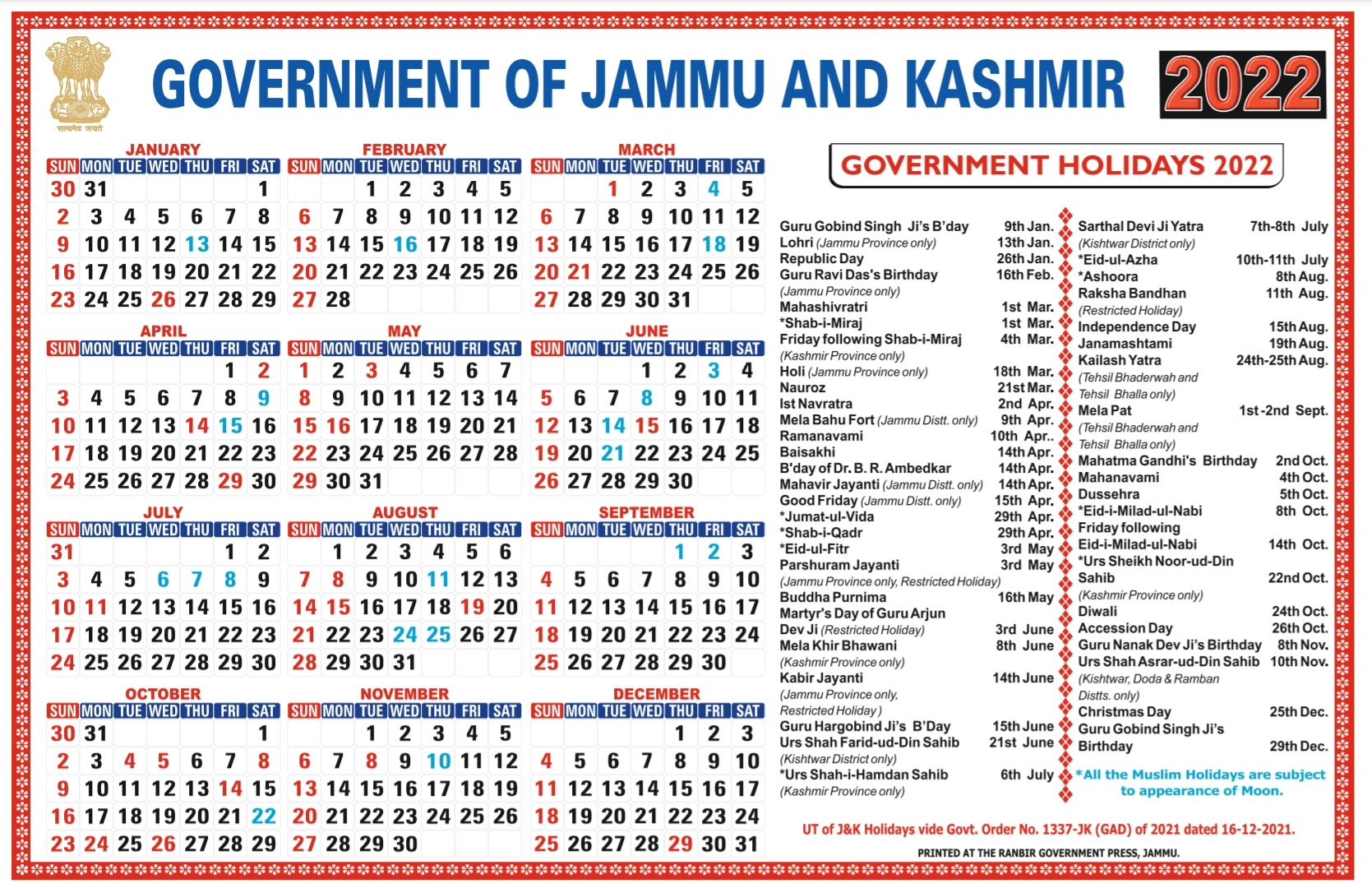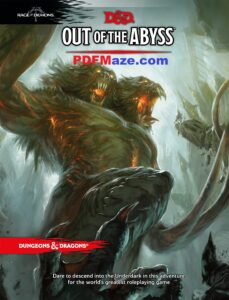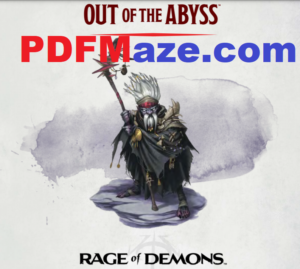

Additional Information
Out Of The Abyss PDF
by
Wizards RPG Team
D&D Encounters:
Welcome to a special introductory edition of the Out of the Abyss PDF adventure, designed specifically for D&D Encounters (an official in-store play program) and the D&D Adventurers League (the official D&D organized play system).
This edition of the adventure is designed for 1st through 4th-level characters, and is divided up into three chapters, each of which contains a number of potential adventure scenarios. Characters who finish all three parts of the adventure should reach 5th level at the end. Characters of 5th level and above cannot play in this D&D Encounters edition of the adventure, though they can play the full adventure of Out of the Abyss.
Each part of the adventure should be played over multiple sessions of play. For D&D Encounters, the recommended session length is two hours. The full adventure contains additional play beyond this edition. Playing this adventure in store as a part of D&D Encounters is fun and offers additional benefits to enhance the experience.
Folios connecting characters to different factions in the world of the Forgotten Realms are provided for players, containing information and accessories, along with exclusive rewards. Dungeon Masters (DMs) receive a folio as well, themed to the storyline season (for this season, Rage of Demons). Check with your store for more details. If you received this adventure and aren’t currently associated with a store, you can find a nearby store by heading to our Store and Event Locator.
The D&D Adventurers League:
This adventure is official for D&D Adventurers League play. The D&D Adventurers League is the official organized play system for Dungeons & Dragons. Players can create characters and participate in any adventure allowed as a part of the D&D Adventurers League. As they adventure, players track their characters’ experience, treasure, and other rewards, and can take those characters through other adventures that will continue their story.
D&D Adventurers League play is broken up into storyline seasons. When players create characters, they attach those characters to a storyline season, which determines what rules they’re allowed to use to create and advance their characters. Players can continue to play their characters after the storyline season has finished, possibly participating in a second or third storyline with those same characters.
A character’s level is the only limitation for adventure play. A player cannot use a character of a level higher or lower than the level range of a D&D Adventurers League adventure.
Preparing the Adventure:
You don’t need to prepare this entire adventure for the first session. Simply get to know the setup of each chapter prior to playing, paying attention to the open ended nature of this adventure and the different ways you might construct your D&D Encounters sessions.
As you do so, spend some time familiarizing yourself with the adventure’s locations, events, and characters including the drow outpost of Velkynvelve in chapter 1 and the kuo-toa settlement of Sloobludop in chapter 3.
You’ll also want to review the relevant statistics for any monsters or nonplayer characters (NPCs). Each part of the adventure contains a “Designing D&D Encounters Sessions” sidebar that talks about how to divide that part of the adventure up into two hour sessions for D&D Encounters play.
This adventure features a wide-open play style that means you will most often be creating sessions based on the characters’ goals and the players’ choices during the game, rather than forcing the characters to adhere to a fixed roster of events and locations. Random encounters are also an integral part of the adventure, especially as developed during the characters’ travels in chapter 2
Before Each Play Session:
This adventure is designed for three to seven 1stto 4th-level characters, and is optimized for four characters. Players that have characters outside that level range cannot participate in the adventure with those characters. Players with ineligible characters can make a new 1st-level character or use a pre generated character.
Players can play an adventure they previously played or ran as a DM, but not with the same character (if applicable). Ensure that all players have official Adventure Log Sheets for their characters. Each player will fill out the adventure name, session number, date, and your name and DCI number.
In addition, the player also fills in his or her character’s starting values for XP, gold, downtime, renown, and number of permanent magic items. Players will fill in the other values and write notes at the conclusion of the session. Each player is responsible for maintaining an accurate log sheet.
You can do a quick scan of a player’s character sheet to ensure that nothing appears out of order. If you see magic items of very high rarity or strange arrays of ability scores, you can ask a player to provide documentation for the irregularities. If a player cannot, feel free to restrict item use or ask the player to use a standard ability score array.
Downtime and Lifestyle:
At the beginning of each play session, players must declare whether or not they are spending any days of downtime. The player records the downtime spent on the adventure logsheet. The following options are available to players during downtime:
- Crafting (exception: multiple characters cannot commit to crafting a single item)
- Practicing a profession
- Recuperating
- Training
Other downtime options might be available during adventures or unlocked through play, including faction specific activities. In addition, whenever a character spends downtime days, that character also spends the requisite expense for his or her lifestyle. Costs are per day, so that a character who spends ten days of downtime also spends ten days of expenses maintaining his or her lifestyle. Some downtime activities help with lifestyle expenses or add lifestyle expenses.
Player and DM Folios:
At your first session, check with your store organizer to see if faction-specific player and story-specific DM folios are available. These are complimentary, and contain great game accessories and rewards for DMs and players. Whenever a new player shows up, check with the organizer to see if any more folios are available.
After Each Play Session:
As the characters progress through the adventure, they can earn treasure in the form of valuables such as gold, jewelry, and art objects, as well as magic items. In addition, there might be special rewards that are story focused or intangible. Since a group’s composition might change from one play session to the next, you’ll want to have players update their log sheets before leaving the table.
Players are responsible for maintaining their own adventure log sheets. At the end of each session, you should give out rewards earned and each player should record that information on his or her logsheet.
Experience points (XP) are given out to each player. Divide XP by the number of characters, unless otherwise specified in the adventure. Coin, non magical treasure, and other wealth rewards are totaled up in value. That total is then divided by the number of characters, unless otherwise specified in the adventure. Consumable magic items are awarded at the end of each session. Potions, scrolls, and other consumable magic items are divided among the characters. A player notes the item obtained by recording it on his or her logsheet.
Players should attempt to ensure an equitable distribution of consumable items. Permanent magic items are awarded at the end of each session. Permanent magic items are rare, and do not appear often. A player notes each item obtained by recording it on his or her logsheet. See the sidebar for guidelines on how to distribute permanent magic items. Other special rewards are awarded when noted in the adventure, usually at the end of a session.
Awarding Certificates:
The D&D Encounters kit contains certificates for all permanent magic items and any rare or higher rarity consumable items found in an adventure. Whenever a character records such a magic item on his or her logsheet, ask the organizer for a certificate from the kit to award to that player. Certificates can be awarded while supplies last.
Certified magic items are a fun reminder of play, but they also serve an important purpose: most unlock the ability to trade a magic item to another D&D Adventurers League character. Magic items earned without certificates cannot be traded to other characters. Other items in the adventure might also be certified, including special rewards. If a special item or other reward has a certificate, it is noted in the adventure.
Character Advancement:
A character who earns enough XP to advance a level can do so at the end of a long rest or at the end of a session. A character who earns enough renown to advance a rank in his or her faction can do so at the end of either part of the adventure.
Dungeon Mastering Tips:
As the DM running this adventure, you have the most important role in facilitating the enjoyment of the game for the players. You help guide the narrative and bring the words on these pages to life. The outcome of a fun game session often creates stories that live well beyond the play at the table.
Always follow this golden rule when you run an adventure for a group:
Make decisions and adjudications that enhance the fun of the adventure whenever possible.
To reinforce this rule, keep the following points in mind:
- You are empowered to make adjustments to the adventure and make decisions about how the characters interact with the world of the adventure. This is especially important and applicable outside of combat, but feel free to also use the guidelines in the “Adjusting the Adventure” section (below) for groups that are having too easy or too hard of a time in an adventure.
- Don’t make the adventure too easy or too difficult for a group. Never being challenged makes for a boring game, and being overwhelmed makes for a frustrating game. Gauge the experience that the players (not the characters) have with the game. Try to get a sense of what each player likes in a game session (or simply ask the players), and try to give all players the experience they’re after when they play D&D. Give everyone a chance to shine.
- Be mindful of pacing, and keep the game session moving along appropriately. Watch for stalling, since play loses momentum when this happens. At the same time, try to provide the players with a full play experience that doesn’t finish too early. D&D Encounters sessions are about two hours long, so try to be aware of when you are running long or short. Adjust the pacing accordingly. Each part of the adventure provides guidelines for breaking the action up into D&D Encounters sessions.
- Give the players appropriate hints so they can make informed choices about how to proceed. Players should be given clues when necessary so they can tackle puzzles, combat, and interactions without getting frustrated over lack of information. This helps to encourage immersion in the adventure and gives players “little victories” for figuring out good choices from clues.
Adjusting the Adventure:
This adventure has been designed for optimal play by a party of four characters all starting at 1st level, and who will advance as high as 5th level by the end of the adventure. However, the D&D Encounters format allows for characters of 1st to 4th level, and groups of from three to seven adventurers.
If you are playing with a larger or smaller group, or with a group of four characters starting the adventure at higher than 1st level, you can make adjustments to the combat encounters to make sure the adventure plays well for your group. (You can make the same sorts of adjustments even for a group of four characters of the optimal level if those characters are having too hard or too easy a time in the adventure.)
You may also like : Rise Of Tiamat behold-a-pale-horse
Recommended for you

4.8 ★ • 205
Academic & Education
4.7 ★ • 434
DnD
4.8 ★ • 231
Academic & Education
4.7 ★ • 352
DnD
4.7 ★ • 351
DnD
4.7 ★ • 1.2K
DnD
5 ★ • 305
Religion
4.8 ★ • 489
DnD
4.8 ★ • 351
DnD
4.6 ★ • 392
DnD
4.8 ★ • 389
DnD
4.7 ★ • 340
DnDYou may also like

4.7 ★ • 456
DnD
4.8 ★ • 351
DnD
4.5 ★ • 879
JK Bank
4.3 ★ • 761
English
3.5 ★ • 621
Engineering
4.5 ★ • 477
Religion
4.4 ★ • 769
Editor's Choice
4.5 ★ • 802
DnD
4.7 ★ • 608
Religion
4.4 ★ • 407
novel
★ • 274
Academic & Education
4.7 ★ • 351
DnD






Comments